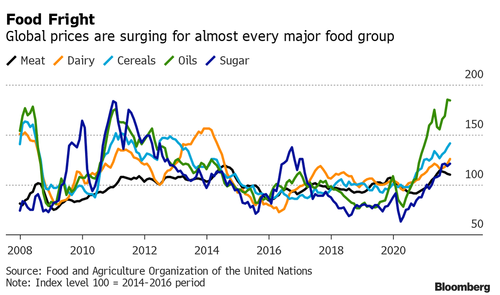Across the world, households are experiencing an exponential rise in food inflation.
This holiday season, from Brazil to China to European countries to the
US, households will pay near-record prices for food, which begs the
question: Are households able to afford traditional food, or will they resort to substitutes to save money?
"You
might be able to trade down on some things; instead of the high-priced
turkeys or steaks, you might consider something less expensive on that
side of the dinner table," Curt Covington, senior director of
institutional credit at AgAmerica Lending, which lends money to farmers,
told Bloomberg.
"But there's no escaping it: Everything on the holiday table "is just going to be more expensive," Covington said.
For
example, working poor Americans have had trouble affording essential
goods amid rapid inflation. A staggering 6.8% surge in consumer costs is
the highest in four decades, making things like food unaffordable because wages haven't kept pace with inflation. The same is happening for households worldwide
With that in mind, households are likely to substitute popular holiday foods with low-cost items. There's even a chance that some might resort to eating bugs and worms.
European member states certified house crickets, yellow mealworms, and grasshoppers as food fit to be sold at supermarkets.
The bugs will be sold in frozen, dried, and powdered forms and will be packed with nutrients and low-cost, according to Bloomberg. Earlier this month, the World Economic Forum published two articles explaining
how people must get used to eating bugs. Those who can no longer
afford meat, such as ham or turkey, and other traditional holiday foods
will come to find a new substitute. Bloomberg provides examples from
across the world of how food inflation crushes holiday cheer.
Brazil: Amazon Fish Replace Pricey Imports
Fatima
Santos describes her family's planned Christmas Eve supper in 2021 in
one word: lean. Neither cod nor turkey—traditional centerpieces in many
Brazilian homes for the holidays—will make the cut this year, the
41-year-old unemployed hairdresser said while combing the shelves for
deals in a Rio de Janeiro supermarket. "Egg is the new steak in our
home. Even rice and beans are super expensive," she said. That's hardly a
seasonal specialty, but the staple dish might grace more holiday tables
like hers as meat prices become increasingly hard to stomach.
Although
the country is one of the world's largest producers of agricultural
commodities, soaring demand abroad and a weak local currency are making
exports more profitable, leaving less Brazilian-grown food for
Brazilians at home. At the same time, this year's extreme weather—the
worst drought in a century followed by an unprecedented frost—severely
damaged the nation's crops, stoking inflation. Think tank Getulio Vargas
Foundation calculates beef prices are up about 15% in the last year,
while chicken costs have soared more than 24%.
Grocery chain Zona
Sul has been trying to stock its shelves with more local products so
families can avoid the worst of the inflation. Traditional Norwegian cod
is still available in the weeks leading up to Christmas, but the store
is also pushing Amazon fish pirarucu for half the price. With sparkling
wine imports delayed due to container shortages, the chain is
discounting regional alternatives. "As purchasing power diminishes,
people are looking for secondary brands," said the chain's executive
director, Pietrangelo Leta.
Priscila Santana, a professional chef,
usually sells rabanadas—a dessert resembling French toast—around the
holidays. But she's had to boost prices this year by more than 10% on
rising costs for bread, milk and eggs, plus the gasoline required to
even get to the store. Despite starting sales several weeks earlier this
year and accepting both credit cards and company-issued meal tickets,
she's still seeing lower demand. "I expect to sell 20% less this year.
Some of my clients had to give up the rabanadas to buy their lunch
instead.
China: Stockpiling Sends Costs Soaring
There's
plenty of food to go around in the world's most populous country, the
Ministry of Commerce insists. But that hasn't stopped Chinese households
from stocking up—and in some cases, hoarding—following a confusing
advisory from the government in early November that encouraged people to
restock essentials ahead of winter, stoking fears of travel
restrictions, virus outbreaks, extreme weather or worse.
"Usually
one family only needs to store one bag of flour, but now they're buying
two or even three bags. Of course prices will increase," said one
shopkeeper who's been selling noodles, dumpling wrappers and Chinese
pancakes for almost 30 years. Speaking from behind his stall in a market
in Beijing, he asked to only be identified by his family name, Zhou.
"The more families hoard flour, the higher prices will go."
The
25-kilogram (about 55-pound) bags of flour he buys from his supplier are
about 30% more expensive than a month ago, now costing more than 90
yuan ($14). But Zhou has raised his own selling price by less than 20%,
even as the winter solstice—Dongzhi—nears, boosting demand for
traditional delicacies like dumplings and noodles. "My costs have risen,
but I can't really increase prices or I'll lose customers," he said.
UK: Turkey Farms Pay Up for Labor
"There
isn't a product that we use on this farm that hasn't gone up," said
Becky Howe, a third-generation farmer, as she watched workers guide a
flock of turkeys to an open barn on the last day of slaughtering at the
John Howe turkey farm outside Kent. That includes the cost of steel used
to construct the barns, chopped straw for bedding, corn feed, gas,
packaging cartons and even wax for the automated plucking line. The farm
wasn't anticipating such inflationary pressure when it boosted the size
of this year's flock by 25% and, for the first time ever, started
rearing geese, too.
The greatest headache has been finding enough
workers during November and December, the farm's busiest time of the
year. Most of its employees are foreigners, who come to the country on
temporary visa permits; the farm has boosted pay this year to retain
staff. It has raised the price of its turkeys by 8%, but its own costs
have gone up more. "The price increase hasn't covered everything and
we've had to absorb as much as we possibly could," Howe said. "We don't
want to pass on too much and scare people away from buying our turkeys."
Worried
about rising prices—plus a shortage of UK truck drivers that will only
exacerbate the squeeze—grocers say some families in London started
buying their Christmas turkeys as early as October this year. The demand
for smaller birds is particularly high as virus fears temper optimism
that extended families will be gathering again this year after a 2020 in
lockdown
Romania: Priced Out of the Pig Slaughter
In
the Romanian countryside, the Orthodox celebration of Saint Ignatius on
Dec. 20 has followed a traditional script for centuries: Buy a pig from a
trusted farmer, slit its throat, burn the skin, and clean the carcass
with help from friends and family at the break of dawn. Every part of
the animal—from the legs to the fat to the intestines—are then
transformed into dozens of dishes to feed a household's extended family
at Christmas, New Year's and every meal in between.
At least, that
used to be the custom. This year, more families will just snag some
supermarket sausages on their way home from work and call it a day, said
Adi Rusu, a 40-year-old farmer from the village of Posta Calnau. Rusu's
family has been growing pigs for 40 years, but with feed and
electricity costs through the roof, risks of a deadly swine fever
outbreak and customers increasingly opting for easier options, his
family's talking about whether it's even worth the hassle. It's hard for
neighbors to justify paying as much as 1,500 Romanian lei (about $340)
for a local pig, a 50% hike over the last four to five years. At the
same time, Covid travel restrictions that keep many working Romanians
abroad mean downsized dinners—and little incentive to cook enough pork
to eat for at least seven straight days.
"It's becoming obvious we
can't eat three times more than in a regular week at Christmas," said
Marioara Mihalcea, the director of meat company M&R in Iasi. "You
know you can always find fresh meat on the shelves."
Rusu only had
six pigs on offer this year, about a fifth of what he'd normally sell,
after many of the piglets died at birth, but he decided supplementing
with more piglets from commercial farms to turn a profit of only 400 lei
(about $90) apiece just didn't make economic sense this year. Would-be
customers are "not buying from someone else; they're going to the
supermarket," said Rusu, who picked up animal farming from his father.
"Those who know how to prepare it are slowly passing away, and the young
are not interested in learning."
US: Cookie Season Takes a Hit
Americans,
eating more butter than ever before, will find it costs them more than
their waistline this holiday season. Once vilified for saturated fat,
butter has become popular again as shoppers embrace high-fat diets,
driving per capita consumption to 6.3 pounds in 2020, the highest in
data going back to the Ford presidency. Butter consumption typically
peaks in the fourth quarter, thanks to all the holiday cookies, mashed
potatoes and other full-flavored traditions that grace the table. It's
also soaring in price.
Spot wholesale prices for Grade AA butter
are up about 40% from this time last year to more than $2 a pound.
There's plenty of milk to make it, but packing and shipping have been a
challenge amid widespread labor and materials shortages. Grassland Dairy
Products in Greenwood, Wisconsin, recently raised its prices for
supermarkets for the first time in four years. President Trevor
Wuethrich cited rising cardboard expenses, trucking issues and its own
decision to hike hourly wages in September in order to retain trained
employees.
Some households may make the switch to vegetable-oil
spreads, like margarine, to cut costs, though those are rising in price,
too. Dina Cimarusti, owner of newly opened Sugar Moon Bakery in
Chicago, just paid 40 cents per pound more than usual for butter in
early December. For her, subbing it out isn't an option: It's an
important ingredient for many of her home-style pastries including
scones, cookies and cakes.
"It's not just butter," she said. "Even
my produce prices have gone up significantly since I opened," said
36-year-old Cimarusti, whose storefront debuted in September. "Unless I
raise my prices, I'm obviously losing money." For now, she's holding
pat. "I was just going to wait it out," she said, clad in a green apron
and jeans, weighing pound-blocks of butter before dumping them into a
large steel mixer for molasses cookies. "I just try to keep it
affordable."
Simply put, inflation increases food
insecurity that will dramatically reshape traditional holiday dishes.
Some may resort to eating bugs and worms this year.
https://www.zerohedge.com/commodities/food-inflation-grinch-spoils-christmas-cheer













